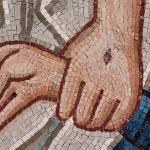What does it cost to do the right thing? Especially when doing the right thing means your whole life comes tumbling down around you? A whole life that is good, well-lived, and couples business expertise and success with the respect of the larger community?
A movie, Locke, explores that concept in an agonizing 90 minute car drive. Writer-director Steven Knight’s film, which won the British Independent Film Award for best screenplay, invites us into the life of Ivan Locke. I would normally not have even heard of this film but viewed it because a friend of mine active in the theater and arts community where I live recommended it.
I came out stunned and troubled at my own response.
Ivan Locke, played by Tom Hardy, is a successful architectural foreman and beloved husband and father. We enter his story the night before the biggest concrete pour in architectural history; he is also expected home for family night and highly anticipated soccer match.
But Ivan does not go home. He turns the other way, and starts making phone calls, only indicating to his stunned boss, his terrified work subordinate, and his puzzled family that something has come up and he will not be home that night nor at the pour that starts at 5:45 am the next morning.
The viewer accompanies Locke through the car ride, hearing every increasingly frantic phone call, seeing Ivan get fired, sympathizing with his family, and soon discovering the reason for the mysterious decision.
Ivan Locke, a man of great moral rectitude, had, in a moment of weakness after three months away, slept with the secretary assigned him on that particular job. She became pregnant, and now lays alone in a hospital, frantic, about to give premature birth.
When trying to explain to his horrified wife, Ivan describes this woman, Bethany, as older, unattractive, unhappy and lonely. He has no affection for her.
But he chooses to do the right thing, go to her as she gives birth, and give the baby his name.
The phone calls are interspersed with an ongoing inner dialogue between Locke and his father (represented by an empty back seat) whom he hates for having abandoned Locke and his mother at his birth. Locke must prove to himself that he is not the degraded human being that his father was.
Everything in me wanted Locke to abandon his quest, forget about doing the right thing, and do the expedient thing that would have kept his life together. Expediency would have been to abandon that pitiful pregnant woman and return to his safe, warm, successful life.
The right thing meant he kept going.
As I walked out of the movie, the first part of a well-known, three-part story Jesus told about the nature of the Kingdom of Heaven wrapped itself around my mind. Most of us know the third part of the story–it’s about the wayward son who demanded his inheritance early and then went to a far country and wasted it. He returned home, hoping to beg for work as a slave to his father, but is instead given a place of honor.
The second part of the story speaks of a woman who had ten coins, and had lost one. When, after a long and frantic search, she finds the lost coin, she invites everyone to a party.
The first part is often just skated over–it speaks of a shepherd who has ninety-nine happy and healthy sheep and then walks off and leaves them to their fate, which could be disastrously bad, so he can find the one stray sheep.
That three-part story simply shocks Jesus’ listeners. Ivan Locke exquisitely portrays that shock as we see the cost of leaving behind the ninety-nine sure-thing sheep in order to save the lost.
This film is a gift-one the filmmaker may have never intended–of a portrayal of power of love that gives us the hope of redemption. And not just me–but anyone. We’re all the one who strayed–and it costs to get us back.
















